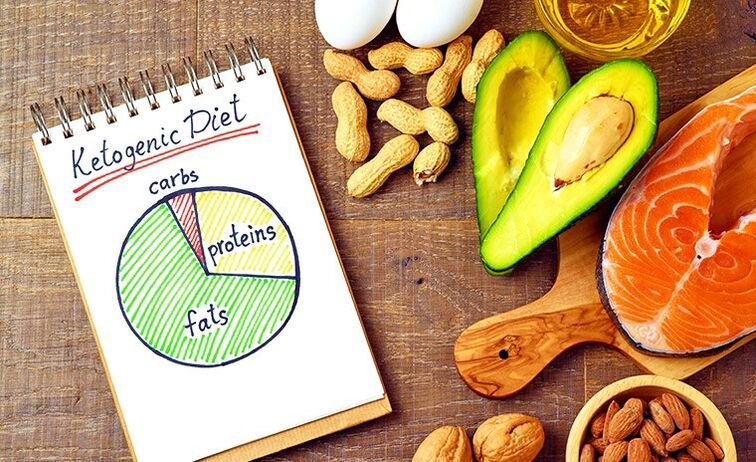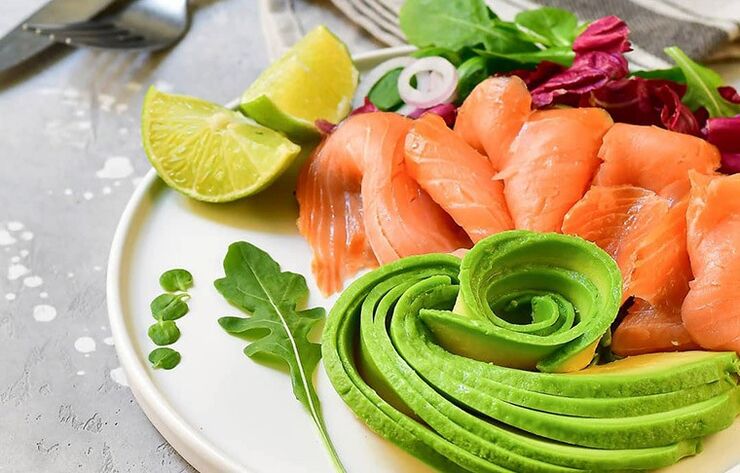
If twenty or thirty years ago someone had put all the products in two baskets, sorting them by the most useful and most useful, you would have to conduct a thorough review of them today. elaborate. The strangest story happens during this time with being fat - humanity's recent major enemy not only has not been fully recovered, but has almost been declared its savior. Is this true, nutritionist Chris More understands.
Recently, a patient confessed to me that she and her husband eat almost a kilo of bacon a week - three slices for breakfast, and then two more slices with salad at lunch. I've been working as a dietitian for over twenty years, and nothing seems to surprise me, but then I still can't resist and ask: why? The patient said that her husband had seen a TV show about the keto diet, and they decided to try it. Six months of eating bacon - and now the husband has lost 9 kg and, according to his wife, is almost full of energy that overwhelms him.
More and more, I hear people talking about the miracles that the keto diet does for them. They claim that it burns fat in the body, invigorates and conquers disease, and from now on not only can but also eat as much bacon as you like. But all their enthusiasm needs at least a serious test - is the keto diet without animal fat restrictions really that good?
The Ketogenic diet is a low-carbohydrate, high-fat and moderate-protein diet. It was originally used in the treatment of epilepsy in children by increasing the levels of ketone bodies in the blood.
What is Ketosis?
Let's start with the name of the diet: where did this "keto" come from? When the body is desperate for carbohydrates - due to diabetes or prolonged hunger, for example - it has to break down its own fat more actively than usual for energy. Ketosis develops: metabolism is disrupted and more ketone bodies than necessary accumulate in the tissues. Ketone bodies are products of fat metabolism. They are produced by the liver when insulin levels drop in the blood.
Jeff Volek, a professor at Ohio University, explains: "The liver makes ketone bodies all the time, but their levels depend on the carbohydrates and proteins you eat -- the body needs both, " explains Jeff Volek, professorprofessor at Ohio University explains.
The breakdown of body fat in a healthy person and the formation of ketone bodies is a normal process, it is called ketogenesis. Unlike ketosis, ketogenesis does not lead to significant weight loss. Ketosis is a condition that, in addition to diabetes and prolonged fasting, can be caused by the keto diet, as it virtually excludes carbohydrate foods from the diet. A person who has developed ketosis loses weight suddenly, as well as due to some other medical condition.
The ketogenic diet forces the body to use fat as its main source of energy. Normally, this role is performed by carbohydrates, which, when eaten with food, are processed into glucose, which is extremely important for nutrition and brain function. However, if the diet is low in carbohydrates, the liver converts fat into fatty acids and ketone bodies. Ketone bodies enter the brain and are used as an energy source instead of glucose. An increase in the level of ketone bodies in the blood (ketosis) leads to a decrease in the frequency of seizures.
On the keto diet, the main part of the daily diet - between 60 and 80% - is fat, protein - about 15%, and only the remaining 10% is carbohydrates (this is about half of a small portion). ). At first glance, it looks like the Atkins diet, but the keto diet involves more severe carbohydrate restriction, according to Spencer Nadolsky, author of The Fat Loss Prescription. Some theorists often guarantee that the less carbohydrates we eat, the more fat our bodies burn, and for this reason, metabolism improves, immunity increases - and sayIn general, various miracles begin to happen to our bodies.
However, in normal life, we get about half of our calories, and not one-tenth of them from carbohydrates. So, in essence, the question is: can your body stay in ketosis long enough to reach the promised nirvana without serious health consequences? You'll literally start freaking out about fat, right?
Is the keto diet right for you?
It sounds strange, but the best diet for you is the one you're used to following. As for Volek, who's been on keto for twenty years, she's fine, but is she right for you? Unfortunately, there are no studies on what happens in the body of someone who has been on a keto diet for a long time. In the A to Z Weight Loss Study, scientists studied the Atkins, Zone, LEARN diets, and several other diets, but in the study, female subjects consumed 25 to 35%carbohydrates - this number is not even close to the 10% advised to restrict yourself to the keto diet.
The only thing that is known for sure: following the keto diet, you will actually lose weight. In Italy, in 2015, they studied the performance of people sitting on it, and in three months on average, they lost about 10-12 kg. A year earlier in Spain, it turned out that in a year in this way you can lose about 20 kg. True, over the next year, subjects typically returned to their pre-test weight, right after they came off the rigid diet.
What would you eat if you decided to try it? First and second, it's bacon. Among the remaining products, there will not be many suitable for you. Starchy vegetables - potatoes, pumpkin, corn - are strictly prohibited, like most fruits. Milk, beans, rice and pasta will also have to be forgotten.
The keto diet is difficult to follow and can be dangerous for some people. Dr Alan Aragon said: "Extreme diets, especially the keto diet, are strictly contraindicated in people with neurodegenerative diseases such as epilepsy.
The ketogenic diet is considered optimal in society for weight loss. However, according to scientific evidence, the effect of weight loss immediately after switching to a ketogenic diet is due to the reduction of body water and body fat that is influenced only by energy balance. To lose weight, the energy supplied from food must be less than the energy expended in physical activity. One of the benefits of the ketogenic diet, like other low-carb diets, is that the ketosis that occurs with a low-carb diet contributes to weight loss in obesity. The difference in calorie intake can be in the thousands of kilocalories per day compared to a low-fat diet. The effectiveness of the ketogenic diet is highly dependent on the protein content of the diet.
Can I take drugs that increase my ketone body? There are no cases. Don't listen to "experts" who will assure you that even without any diet, you can induce ketosis with the help of special drugs.
So is the keto diet right for you? If you are an extreme athlete who is willing to test your body, if you like taking risks and fast results are important to you, then give it a try! If you just want to lose a few pounds and have experienced the "yo-yo effect" in the past (when, after a strict diet, a person loses weight and gains more than it loses), then perhapsyou should not risk it. However, if you approach the keto diet wisely, there are three lessons you can learn from it that will certainly help.
- Reduce your "empty" carbohydrates. Analyze the foods you get the most in your daily carbohydrate intake: if it comes from fruits rich in fiber and antioxidants that's fine, but if your carbohydrate sources are candy, soft drinks and any foodwhite flour, you know What to do: Throw them in the trash.
- Don't avoid fat. The fascination for low-fat foods that began in the '90s can be safely left in the past. Nothing good about that. Usually, to make up for the lack of fat, manufacturers increase the amount of sugar in such products. Eat fatty fish like salmon, mackerel, or sardines at least twice a week. And whatever you cook, don't skip the vegetable, especially olive oil.
- Eat more vegetables. All leafy greens and greens go well with foods high in fat and protein – fans of the keto diet will eat plenty of them. And you do the same. Eat kale, spinach, collard greens, arugula and other salads without restriction.
What happened to my bacon patient? Their nutrition experiments continued precisely until the moment their child was born. Of course, they immediately forget about the diet (there is no time to think about it, as the young mother explains). So remember: sooner or later you'll get tired of constantly stuffing bacon and you'll be back to your usual, familiar dish.
Cooking recipe

Salmon and Asparagus Salad
Ingredient:
- 150 g salmon fillet;
- 80 g of green asparagus;
- 1/2 head of ice lettuce;
- 2 eggs;
- 4 anchovy fillets;
- 5 cherry tomatoes;
- 5 large capers (or 6–8 small ones) - soak capers in salt, not in brine, they must be washed before use;
- 1/2 medium purple onion;
- 6-8 Articles. l. olive oil;
- 1 teaspoon Dijon mustard;
- juice of half a lemon.
How to cook:
- If you've ever cooked nicoise, you can treat this salad, too. It practically repeats the main course of Nice, using only fatty salmon instead of tuna, and asparagus is used instead of green beans (you can also use beans, though).
- Salmon is best not cooked in a hot pan or in a hot oven, but steamed or in a slow cooker: 20-30 minutes at 80-85 degrees, not higher (otherwise the protein will roll and the fish will turn out). difficult). But you can also fry in a pan (just don't overdo it! ) - the fish should be tender and retain its transparency inside.
- Cook asparagus. It needs to be crispy, so don't overcook it! Cooking time depends on its size, so we don't recommend leaving the stove - asparagus cooks quickly.
- Place the separated ice on a plate (lettuce needs to be washed, dried and torn into medium pieces), asparagus, salmon in large pieces, half cherry tomato, anchovies, capers, onionssliced potatoes and boiled. eggs (ideally the yolk should not be liquid but soft). Top of the field with olive oil sauce with Dijon mustard and lime juice. You don't have to salt the dish - anchovies and capers are already salty enough.
The ketogenic diet is used by athletes participating in endurance sports, such as cross country running, triathlon, cycling, etc. v. prolonged exertion.
Bacon and Lettuce Salad
Ingredient:
- 2 palm-sized heads of lettuce
- 100 g of pork belly;
- 8 mint sprigs;
- 1 egg yolk;
- 6 tbsp. l. olive oil and a little more for frying;
- 1 teaspoon granular mustard;
- 1 tbsp. l. cutting Sherry.
How to cook:
- For this salad, you will have to make the sauce a little more complicated: put mint leaves and mustard in a tall glass, add egg yolks, pour in sherry vinegar. Whip with a blender while adding olive oil in a dilute form.
- Cut the lettuce in half lengthwise and quickly sauté over high heat. It will be slightly caramelized, that is to say, golden brown, with the inside still fresh and crispy. Fry bacon over high heat without oil or in the oven until the meat becomes crispy. Arrange the salad, bacon and sauce on a plate. Garnish with mint leaves.














































































